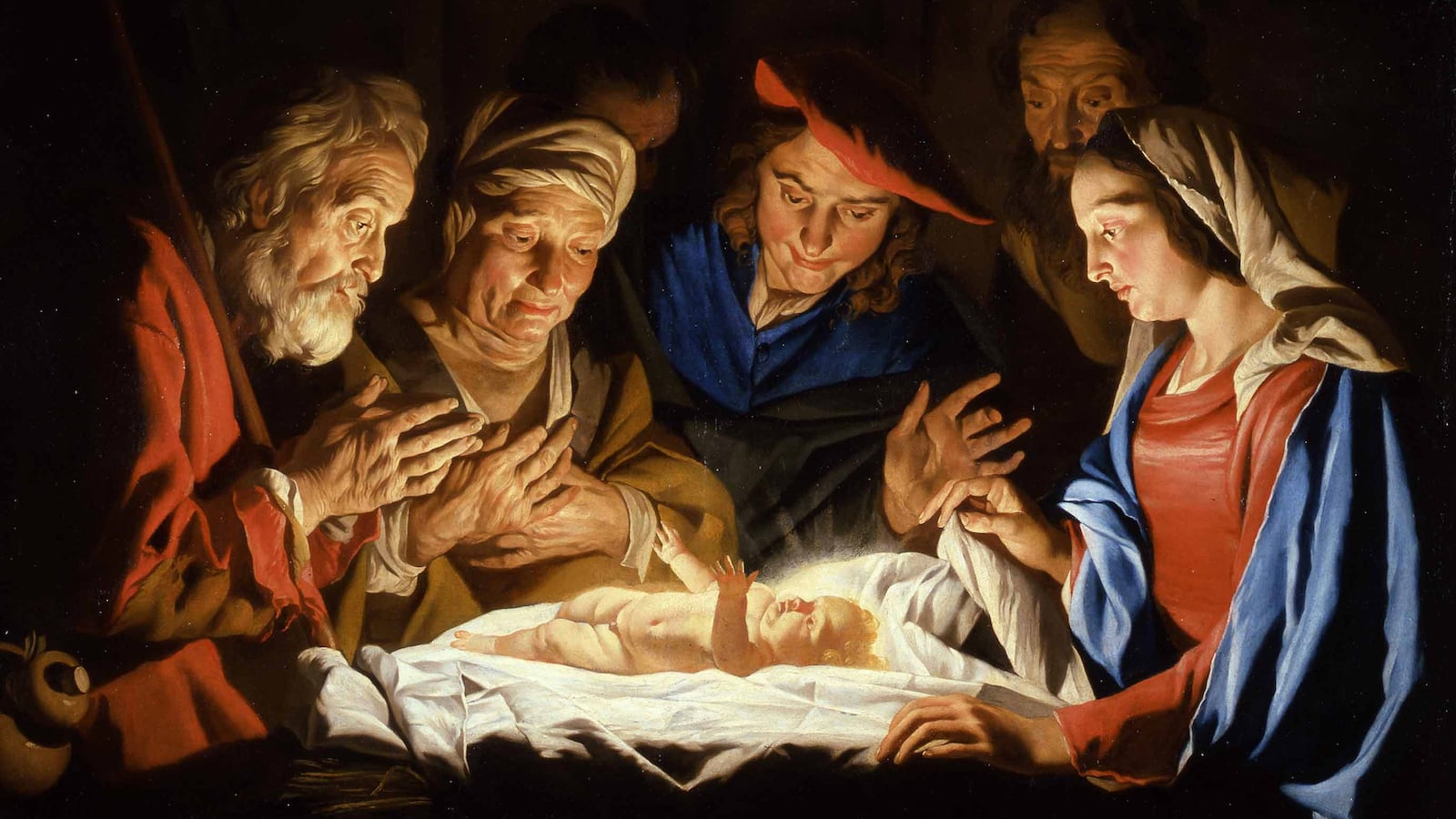The arrival of a newborn is always an occasion for celebration and joy. A child’s first Christmas, however, is also an opportunity for family members to project their hopes and unfulfilled dreams onto the next generation. That Harvard onesie or baseball bat under the tree are not-so-subtle hints about the life you want for your child. Just as people heap expectations on new arrivals today, baby Jesus had a lot to live up to. For Christians, Jesus is the Messiah, the anointed one of God, a descendant of King David, and the one who would save the world. That’s a lot for any of us to shoulder, but especially an infant. These messianic expectations are particularly prominent during the Christmas season popping up everywhere from beloved Carols to children’s Christmas books. But what does it mean to call Jesus the Messiah? And did Jesus live up to society’s expectations?
Even if you think of Christmas as more about the tree, Santa, and present than anointing or kingship, the imagery and language of a royal messiah ripples through the Christmas story. According to the Gospel of Matthew, the Magi (sorry, there aren’t Three Kings in the Gospels) come to see the one “born King of the Jews.” The angels proclaim the arrival of “Christ the Lord” to the shepherds in the Gospel of Luke. The word “Christ,” which to modern readers seems like a family name, just means “anointed one” and is the Greek version of the Hebrew word “Mashiah” or “anointed.” It’s from the Hebrew that we get the English word “Messiah.” The twin themes of royal lineage and messiahship are found everywhere in the Nativity story.
For Jews who lived at the turn of the Common Era, the Messiah (or messiahs in some instances) was very much on their minds. At the time the holy land was occupied and controlled by the Roman Empire, and people wrestled with the economic and political ramifications of foreign occupation. As a result, Jews spoke about a coming anointed one, a Messiah, who was spoken of in scripture and who would liberate them from their oppressors and usher in a new era of independence and flourishing. Matthew Novenson, senior lecturer in New Testament and Christian Origins at the University of Edinburgh, and author of two books on Messianism, told the Daily Beast that the Messiah was “a kind of mythology, that had a solid foundation in scriptural sources, that was useful for making religious sense of Judea’s complicated political situation in the early Roman Empire.”
There was considerable diversity of thought, however, about what the Messiah would be like. Some claimed that he would be, like King David, a monarch who would lead a successful military rebellion. Others emphasized his prophetic or priestly credentials. Others still, like the inhabitants of Qumran who wrote the Dead Sea Scrolls, seemed to have thought that there would be two messiahs. This model reproduces the organizational structure of ancient Israel, when the people were led by both a King and a High Priest.
These messiahs, Novenson told me, “were often associated with certain ancient scriptural heroes, in particular Aaron the high priest and King David.” We can see the same tendency among followers of Jesus: “Our sources about Jesus mostly associate him with King David, either saying that he was a descendant of David, or that he did things like David did, or both.” There was no set script here. The messiah was a mythological construct that was constantly being redescribed and reinterpreted. There were other early Christians, Novenson noted, who tried to distance Jesus from David, just as there were ancient Jews who did not appear to care about the idea of a messiah at all.
The infancy stories about Jesus in the Gospels of Matthew and Luke, however, are preoccupied with messianism because stories about ancient kings and heroes were, generally speaking, fascinated by childhood stories. Just as every Marvel superhero has his or her “origin story” so too biographies of political leaders, generals, and revolutionaries were interested in where the great man came from, who raised him, and what kinds of auspicious events accompanied his birth. In this context the appearance of a star was not unusual. Dr. Robyn Walsh, an associate professor at the University of Miami, told me that “from the biblical Abraham and Moses, to Alexander the Great and the Roman emperor Augustus, the birth of great leaders, heroes, and founders of cities were often marked by celestial events.” Broadly speaking, she said, ancient artwork and propaganda used stars to symbolize the transition of political power or “birth” of a new order. Birth stories, quasi-miraculous events, and narratives about influential figures go hand in hand.
Of course, as every practicing Christian knows, Jesus was no Alexander the Great or Augustus. He didn’t overthrow the Romans or lead a successful rebellion. As a result, later generations of Christians (including our own) reinterpreted the references to messiahship in the Gospels as spiritual kingship, rather than literal earthly rule. This simple fact led to the development of a particularly problematic explanation that is found in modern scholarship, religious writings, and on popular websites: the idea that the Christian messiah wasn’t political, he was spiritual.
A study guide for high school students, produced by the BBC, for example, hints at this idea. It suggests that the term Messiah may not be helpful because it might “confusing[ly]” evoke ideas of earthly monarchy. It would be a “misleading,” it seems, to think of the messiah as a political earthly figure.
Out of this crucial distinction have grown other antisemitic sentiments and ideas: namely, that Jews couldn’t understand their own scriptures. Jews of Jesus’s day, the argument goes, may have been anticipating a political messiah, but they were fundamentally wrong. The Christian website gotquestions.org, for example, connects this supposed misunderstanding about the Messiah to an even more troublesome idea: the Jewish rejection of Jesus. The website reads, “The Jews rejected Jesus because He failed, in their eyes, to do what they expected their Messiah to do—destroy evil and all their enemies and establish an eternal kingdom with Israel as the preeminent nation in the world. The prophecies in Isaiah 53 and Psalm 22 describe a suffering Messiah who would be persecuted and killed, but the Jews chose to focus instead on those prophecies that discuss His glorious victories, not His crucifixion.”
(At risk of being a pedant, although they are important passages for Christians, we should note that neither Isaiah 53 nor Psalm 22 refer to a crucified messiah. It thus seems unfair to imply that Jewish interpreters were overlooking something. You have to have a suffering messiah to read these texts this way.) The bigger problem here is the idea that Jews rejected Jesus: Jesus himself and all his first followers were Jews. Historically, the idea that Jews rejected Jesus has been linked to the dangerous and erroneous idea that “the Jews” were responsible for killing the messiah.
Some Christians go even further and assert that Jewish messianism is not just wrong or mistaken, it is actually demonic. In his work on messianism, Novenson argues that these explanations aren’t just tragically cruel and antisemitic, they are also grounded in some profound historical errors. When Christians claim that Jesus was a spiritual messiah they do so because they “take for granted the messiahship of Jesus and say whatever they need to say to maintain that axiom.” It’s precisely because Jesus suffered and because Christians believe he was the messiah that Christians argue for a spiritual messiah who suffers.
In truth, says Novenson “Christian messianic texts are not categorically different from Jewish messianic texts.” They do describe Jesus as a political figure. Novenson told me that, “The idea of Jesus as a political, not just spiritual, messiah appears in a number of Gospel sayings and stories (e.g., Matt 10:34: “I did not come to bring peace, but a sword”), but above all in the widespread early Christian idea of the future coming (or parousia) of Jesus to execute judgment and rule over the nations.” In other words, early Christians do anticipate that Jesus will behave as a political messiah, just not yet.
The sharpest example of this, Novenson said, is the book of Revelation in which Jesus returns and a New Jerusalem descends onto the earth. There are all kinds of things to worry about in this vision of the Second Coming—Revelation describes genocide and the widespread destruction of non-believers in ways that should be ethically concerning for devout Christians—but the point here is that the Jesus of end of days is as political a messiah as they come. As Wil Gafney, author of the recently published Womens’ Lectionary for the Whole Church and Hulsey Professor of Hebrew Bible at Brite Divinity, has written, this is the problem with romanticizing monarchy and Christly kingship. David, who we name-check throughout our Christmas celebrations, was a warlord and a thug. Kingship, says, Gafney, “comes with so much baggage.” If we want to augment the messiahship of Jesus it should be for this reason.
What the broad view of Christian messianic expectation means, Novenson writes in his book Grammar of Messianism, is that Christianity did not change the definition of messiah; it just chose from among the available ancient Jewish definitions, then added its own details to the developing tradition. It’s one thread in a tapestry of ancient interpretative traditions about the meaning of scripture and the identity of the messiah. “We can see a very similar thing,” said Novenson, “happening in texts about other Jewish messiahs like Judah Maccabee, Bar Kokhba, or Rabbi Judah the Patriarch.” The point of all of this is that the celebration of the birth of the Messiah does not need to invoke inaccurate or antisemitic ideas about Christianity’s superiority to and difference from Judaism. Christianity is not uniquely special. On the contrary, our Nativity story is fully embedded in the theopolitical thought of first century Judaism.


